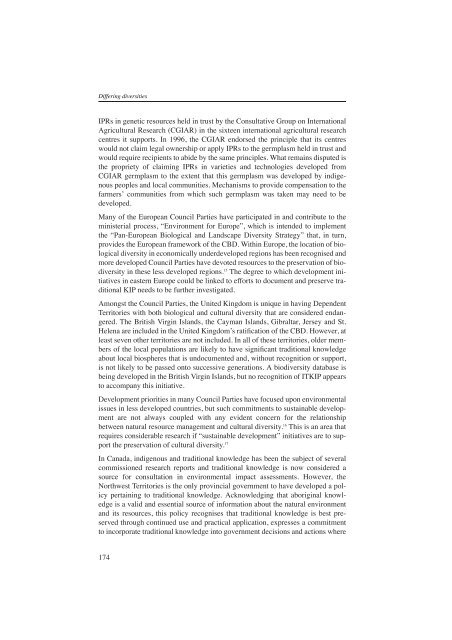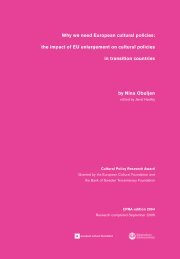Tony Bennett, Differing diversities - Council of Europe
Tony Bennett, Differing diversities - Council of Europe
Tony Bennett, Differing diversities - Council of Europe
Create successful ePaper yourself
Turn your PDF publications into a flip-book with our unique Google optimized e-Paper software.
<strong>Differing</strong> <strong>diversities</strong>IPRs in genetic resources held in trust by the Consultative Group on InternationalAgricultural Research (CGIAR) in the sixteen international agricultural researchcentres it supports. In 1996, the CGIAR endorsed the principle that its centreswould not claim legal ownership or apply IPRs to the germplasm held in trust andwould require recipients to abide by the same principles. What remains disputed isthe propriety <strong>of</strong> claiming IPRs in varieties and technologies developed fromCGIAR germplasm to the extent that this germplasm was developed by indigenouspeoples and local communities. Mechanisms to provide compensation to thefarmers’ communities from which such germplasm was taken may need to bedeveloped.Many <strong>of</strong> the <strong>Europe</strong>an <strong>Council</strong> Parties have participated in and contribute to theministerial process, “Environment for <strong>Europe</strong>”, which is intended to implementthe “Pan-<strong>Europe</strong>an Biological and Landscape Diversity Strategy” that, in turn,provides the <strong>Europe</strong>an framework <strong>of</strong> the CBD. Within <strong>Europe</strong>, the location <strong>of</strong> biologicaldiversity in economically underdeveloped regions has been recognised andmore developed <strong>Council</strong> Parties have devoted resources to the preservation <strong>of</strong> biodiversityin these less developed regions. 15 The degree to which development initiativesin eastern <strong>Europe</strong> could be linked to efforts to document and preserve traditionalKIP needs to be further investigated.Amongst the <strong>Council</strong> Parties, the United Kingdom is unique in having DependentTerritories with both biological and cultural diversity that are considered endangered.The British Virgin Islands, the Cayman Islands, Gibraltar, Jersey and St.Helena are included in the United Kingdom’s ratification <strong>of</strong> the CBD. However, atleast seven other territories are not included. In all <strong>of</strong> these territories, older members<strong>of</strong> the local populations are likely to have significant traditional knowledgeabout local biospheres that is undocumented and, without recognition or support,is not likely to be passed onto successive generations. A biodiversity database isbeing developed in the British Virgin Islands, but no recognition <strong>of</strong> ITKIP appearsto accompany this initiative.Development priorities in many <strong>Council</strong> Parties have focused upon environmentalissues in less developed countries, but such commitments to sustainable developmentare not always coupled with any evident concern for the relationshipbetween natural resource management and cultural diversity. 16 This is an area thatrequires considerable research if “sustainable development” initiatives are to supportthe preservation <strong>of</strong> cultural diversity. 17In Canada, indigenous and traditional knowledge has been the subject <strong>of</strong> severalcommissioned research reports and traditional knowledge is now considered asource for consultation in environmental impact assessments. However, theNorthwest Territories is the only provincial government to have developed a policypertaining to traditional knowledge. Acknowledging that aboriginal knowledgeis a valid and essential source <strong>of</strong> information about the natural environmentand its resources, this policy recognises that traditional knowledge is best preservedthrough continued use and practical application, expresses a commitmentto incorporate traditional knowledge into government decisions and actions where174














